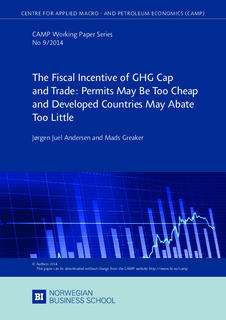The Fiscal Incentive of GHG Cap and Trade: Permits May Be Too Cheap and Developed Countries May Abate Too Little
Working paper
Permanent lenke
http://hdl.handle.net/11250/2364559Utgivelsesdato
2014Metadata
Vis full innførselSamlinger
Sammendrag
The theoretical justification for a greenhouse gas (GHG) cap and trade system is that participants will trade emission permits until their marginal cost of abatement equals the equilibrium price of emission permits. However, for fiscally constrained governments this logic does not apply, as they have a fiscal incentive to let welfare concerns, rather than industrial cost efficiency, guide their abatement policy. Then, global cost efficiency will fail even if just a (small) subset of governments are fiscally constrained. Finally, we argue that any institutional change which breaks the connection between a government's abatement policy and its budget will increase welfare.
